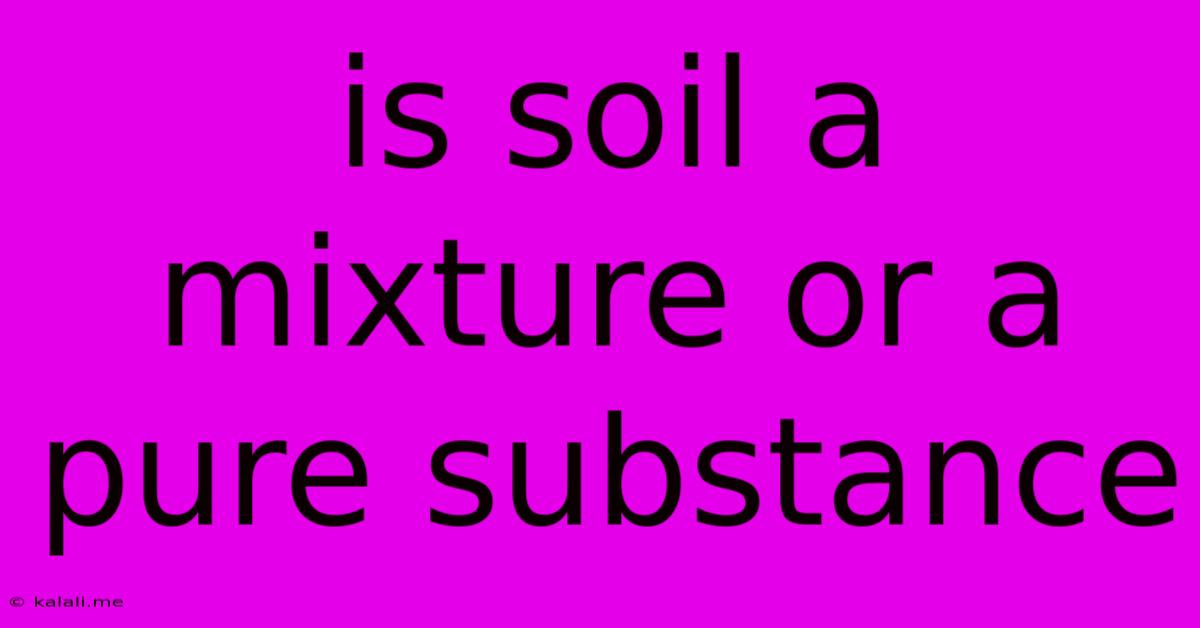Is Soil A Mixture Or A Pure Substance
Kalali
May 10, 2025 · 3 min read

Table of Contents
Is Soil a Mixture or a Pure Substance? A Deep Dive into Earth's Vital Layer
Soil, the seemingly simple foundation of life on Earth, is far more complex than it appears at first glance. This article will explore the fundamental question: is soil a mixture or a pure substance? The answer, as we'll discover, is far more nuanced than a simple yes or no. Understanding the composition of soil is crucial for appreciating its vital role in ecosystems and agriculture.
Soil is a heterogeneous mixture. This means it's composed of various substances that are not chemically bonded together, and its composition can vary significantly from one location to another. Unlike pure substances, which have a uniform composition throughout (like distilled water or pure gold), soil displays considerable variability in its makeup. This heterogeneity is what makes soil such a dynamic and complex system.
What Makes Soil a Mixture?
Several factors contribute to soil being classified as a mixture:
-
Diverse Inorganic Components: Soil contains a variety of inorganic materials, including minerals like quartz, feldspar, mica, and clay minerals. These minerals originate from the weathering of rocks and vary depending on the parent material and geological processes. The proportions of these minerals greatly influence the soil's texture and properties. Think of the different types of sand, silt, and clay particles – each a different inorganic component.
-
Abundant Organic Matter: A key component of healthy soil is organic matter. This includes decomposed plant and animal material, humus (stable, dark-colored organic material), and living organisms like bacteria, fungi, and earthworms. This organic material is crucial for soil fertility, structure, and water retention. This organic component vastly differs depending on the local vegetation and climate.
-
Water and Air: Soil isn't just solid particles; it also contains significant amounts of water and air. The proportion of these components influences soil aeration, drainage, and the availability of nutrients for plants. These are vital for root growth and microbial activity, making them critical parts of soil's composition.
-
Variable Composition: The specific proportions of these inorganic and organic components, as well as water and air, vary greatly depending on factors like climate, parent material, topography, and biological activity. A soil sample from a rainforest will have a dramatically different composition compared to a soil sample from a desert. This variability is a defining characteristic of a mixture.
Differentiating Mixtures from Pure Substances
A pure substance, in contrast, has a consistent composition throughout. It's composed of only one type of atom or molecule. Water (H₂O), for example, is a pure substance. No matter where you sample water, its chemical composition remains the same. Soil, on the other hand, doesn't have a fixed chemical formula; its composition varies widely based on many factors.
The Importance of Understanding Soil Composition
Understanding that soil is a mixture is critical for various applications:
-
Agriculture: Farmers need to understand soil composition to tailor their fertilization strategies, select appropriate crops, and manage soil health effectively. The mixture's balance of nutrients, water, and organic matter directly impacts crop yields.
-
Environmental Science: Soil scientists study soil composition to assess its role in nutrient cycling, water filtration, and carbon sequestration. The composition of the mixture determines how soil functions within an ecosystem.
-
Engineering and Construction: Engineers consider soil composition to ensure the stability of buildings and infrastructure. The mixture's properties directly influence the structural integrity of foundations and other construction projects.
In conclusion, soil is unequivocally a heterogeneous mixture, a complex and dynamic system composed of various inorganic and organic components, water, and air. Its variable composition is what makes soil such a vital and fascinating element of our planet's ecosystems. Understanding its multifaceted nature is crucial for sustainable practices in agriculture, environmental management, and construction.
Latest Posts
Latest Posts
-
How Much Is 100 Gallons Of Diesel
Jun 30, 2025
-
How Much Is 50 Gallons Of Water
Jun 30, 2025
-
How Many Laps Around A Football Field Is A Mile
Jun 30, 2025
-
The Ability To Say Clever And Funny Things
Jun 30, 2025
-
How Many Cups Are In A Pound Of Lard
Jun 30, 2025
Related Post
Thank you for visiting our website which covers about Is Soil A Mixture Or A Pure Substance . We hope the information provided has been useful to you. Feel free to contact us if you have any questions or need further assistance. See you next time and don't miss to bookmark.